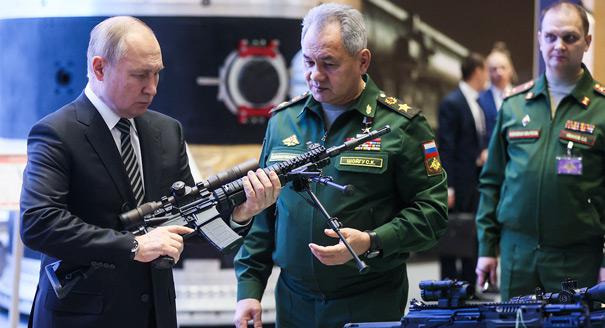A specter is haunting Europe. It’s the specter of war. Most Western media, politicians, and pundits expect Russia to launch renewed military aggression against Ukraine if negotiations with the West ultimately fail. U.S. President Joe Biden has stated publicly that Russia will “move in.” Indeed, a military escalation of the situation is likely, given that Russian President Vladimir Putin has threatened a “military-technical response” if Russia’s core demands for written, legally binding security guarantees from the West are not met. The United States and NATO have already stated numerous times that they are not willing to give in to Russia’s core demands.
This Russian “response,” however, may not necessarily be a (smaller or larger) ground invasion of Ukraine. It may, perhaps, “only” consist of the deployment of Russian nuclear weapons to its western borders, Kaliningrad, and maybe even Belarus: weapons like the RS-26 two-stage intercontinental ballistic missile, the 9M729 medium-range cruise missile, or more of the Tsirkon (Zircon) hypersonic missile. It could also comprise a massive cyber attack on Ukraine’s critical infrastructure, its banking system, and major companies. Neither the deployment of weapons nor a cyber attack would necessarily trigger the massive financial and economic sanctions against Russia currently being discussed in the West. In contrast, a military incursion into Ukraine certainly would.
An invasion would undoubtedly be a major strategic blunder by Putin. While Russia today is better prepared to handle economic and financial sanctions than in 2014, it would certainly suffer a lot. Such sanctions would aggravate the social situation in Russia, where disposable household incomes have been declining for several years, and inflation is rising. While there might be an initial rallying around the flag effect, the risk remains of more and more Russians blaming Putin’s adventurism for Western sanctions. In addition to the sanctions package, the West would respond to a military incursion with the deployment of additional NATO forces to Eastern Europe. These might be “substantial” and “permanent” combat forces, which would kill once and for all the Russia-NATO Founding Act of 1997.
Yet Putin’s predicament is entirely self-made. His threat of a military-technical response is on the table. At the same time, Russian core demands, which Putin considers issues of an existential nature, will not be met. In this case, Putin can either lose face and credibility, or answer using force. Backpedaling would undermine his authority with the military and security apparatus in Russia. More importantly, any future threat made by Putin would no longer be taken seriously by the West. Even worse for Putin, Russian inaction would enable the West to strengthen its narrative that the strategy of deterrence ultimately prevented a Russian invasion of Ukraine.
Putin could have gotten out of this trap, had the Russian side positively evaluated the limited Western concessions that are on the table: arms control of medium-range weapons systems, as well as confidence-building, transparency, and verification measures in the NATO-Russia borderlands, and measures of crisis communication. Putin could have accepted these concessions as a solid win for Russia, which would have allowed him a face-saving diplomatic off-ramp. But he decided not to. Foreign Minister Sergey Lavrov explicitly described these offers as “secondary issues.” He also stated that the Russian draft treaties are not a menu from which the West can pick and choose, but must be negotiated as a package.
It is, of course, worth seeking a diplomatic solution to the current crisis. NATO is defending its “open door” policy with regard to potential new members as a matter of principle. Except for Poland and the Baltic states, however, no other member is seriously contemplating inviting Ukraine to accede to NATO in the foreseeable future. Given this informal position of most of NATO’s members and Russia’s obsession with any further expansion of the alliance, why not declare a moratorium on NATO enlargement for the next ten years? This would help tremendously to de-escalate the crisis. An offer of a moratorium, together with the other concessions that the West has already put on the table, would be a practicable solution. It would not even be putting Ukraine at a disadvantage, since its accession to NATO is not on the agenda in any case.
A hard sell to Ukraine, however, would be its “Finlandization,” which French President Emmanuel Macron mentioned in passing when he was in Moscow on Monday. This would mean military nonalignment, a friendly foreign policy toward Russia, and freedom in domestic affairs. No one in the current Ukrainian establishment would accept such a status. Neutrality would have to be imposed on Ukraine. The question remains of whether the West is prepared to do that. Is it an acceptable price to pay for defusing the crisis?
This material is part of the Russia-EU: Promoting Informed Dialogue project, supported by the EU Delegation to Russia. Gerhard Mangott is one of the EU-Russia Expert Network on Foreign Policy (EUREN) core group members. More info: http://eu-russia-expertnetwork.eu/

.jpg)



